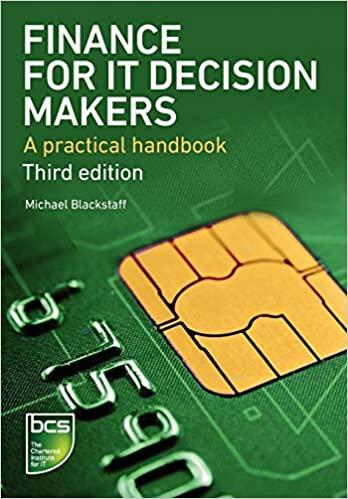Question
Part C- The risk-free rate is 5%, the market risk premium is 8%, and the market return is 13%. Stock Y's beta is 1.85 and
Part C-
The risk-free rate is 5%, the market risk premium is 8%, and the market return is 13%. Stock Y's beta is 1.85 and the standard deviation of its returns is 62.5%. What should be the stock's expected rate of return to make the investor indifferent toward buying or selling the stock?
11.66
12.50
15.54
19.80
Super Solutions Inc. is a constant growth firm, which just paid a dividend of $3.00, sells for $33.00 per share, and has a growth rate of 6 percent. Which of the following is the cost of retained earnings using the discounted cash flow (DCF) approach? (Round off the answer to two decimal places.)
12.40 percent
16.25 percent
15.64 percent
13.35 percent
Assume that a 15-year, $1,000 face value bond pays interest of $37.50 every 3 months. If an investor requires a simple annual rate of return of 12 percent with quarterly compounding, how much should the investor be willing to pay for this bond? (Round the answer to two decimal places.)
$1,120.71
$986.43
$1,358.24
$1,207.57
is the median value of the probability distribution of possible returns
equals the required rate of return for the investment
is the mean value of the probability distribution of possible returns
equals the required rate of return for the investment
Which of the following is a capital component for the purpose of calculating the weighted average cost of capital in capital budgeting?
The after-tax cost of long-term debt
The after-tax cost of preferred stock
The after-tax cost of new equity
Step by Step Solution
There are 3 Steps involved in it
Step: 1

Get Instant Access to Expert-Tailored Solutions
See step-by-step solutions with expert insights and AI powered tools for academic success
Step: 2

Step: 3

Ace Your Homework with AI
Get the answers you need in no time with our AI-driven, step-by-step assistance
Get Started


